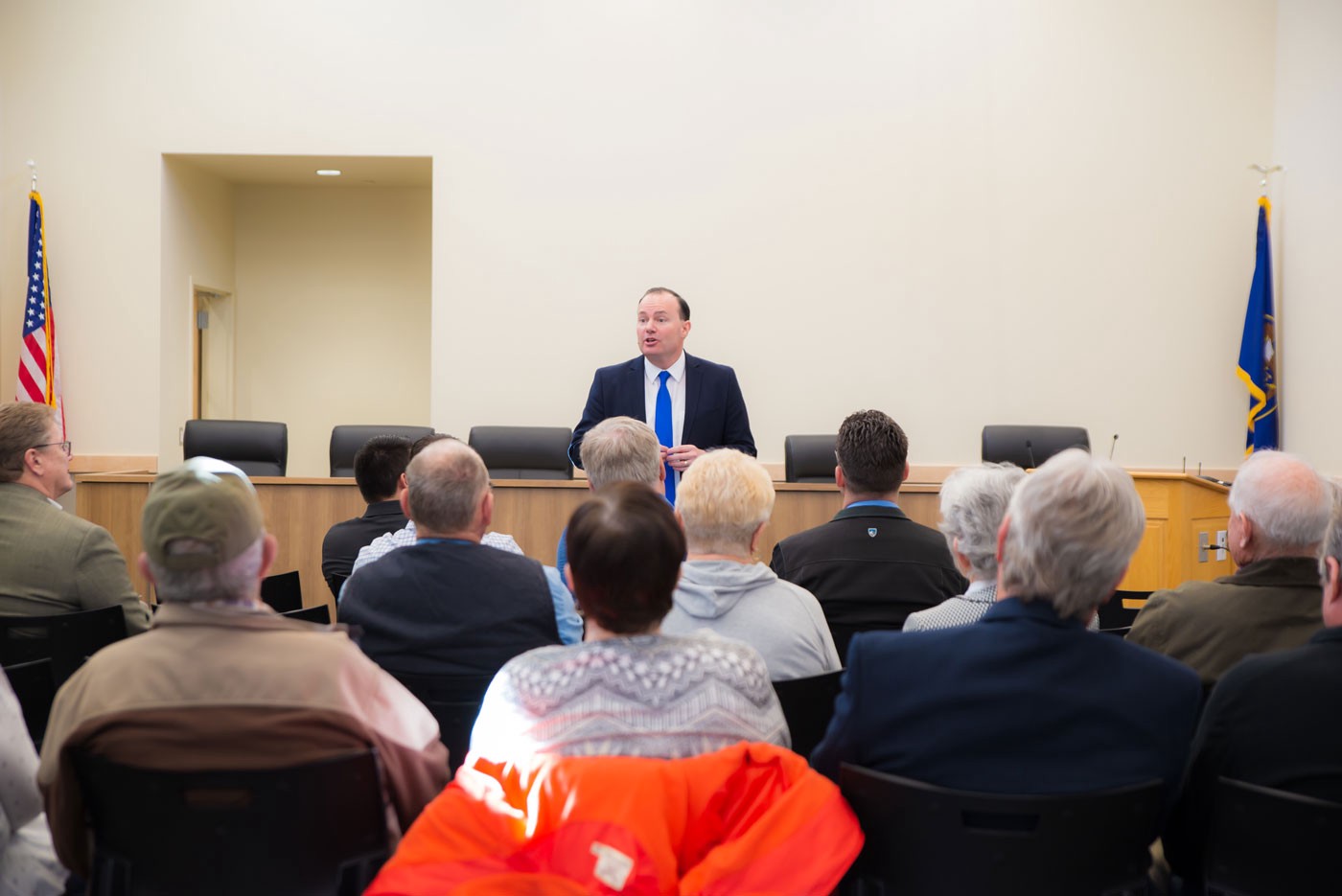Sen. Lee Introduces Allied Burden Sharing Report Act
Apr 2, 2019
Sen. Mike Lee (R-UT) re-introduced the Allied Burden Sharing Report Act today, a bill that would require the Department of Defense to resume submitting an extensive report that includes the common defense contributions of NATO countries and other defense partners, including GCC countries, Australia, Japan, South Korea, New Zealand, Thailand, the Philippines, and signatories of the Rio Treaty.
State Work Week Recap — March 2019
Mar 29, 2019

During the Senate’s state work period last week, I was able to visit 7 of Utah’s 29 counties. Listening to the diverse perspectives found in our great state helps me to better represent the people of Utah in the US Senate.
Here’s a recap of some of my visits.
Yes, Babies Are A Better Solution to Climate Change Than The Green New Deal
Mar 29, 2019
One doesn’t bring posters of tauntauns, Aquaman, and President Reagan riding a velociraptor while firing a submachine gun to the Senate floor without expecting a little bit of controversy. If you are going to poke fun at the prevailing pieties of progressivism on a national stage, a little pushback should be expected.
But what was surprising about the reaction to my speech on the Green New Deal, has been which chart garnered the most vehement anger. It wasn’t Ronald Reagan riding a dinosaur or Utah Gov. Gary Herbert battling tornado-propelled sharks or Speaker Nancy Pelosi asserting that the resolution’s own supporters don’t know what is in it. No, the most controversial poster of the 14-minute speech turned out to be a simple image of six smiling babies.
Dilly Dilly for Farming Fairness
Mar 29, 2019
“Oh, brewers of Miller Lite, we received your corn syrup by mistake,” a king accompanied by a blue knight emblazoned with “Bud Light” shouts to a man in a castle tower.
“That’s not our corn syrup, we received our shipment this morning,” the Miller Lite brewer replies. “Try the Coors Light castle,” the Miller Lite brewer continues, “they also use corn syrup.”
Sens. Lee, Booker Introduce Commodity Check Off Reform Bill
Mar 28, 2019
WASHINGTON – Sens. Mike Lee (R-UT) and Cory Booker (D-NJ) introduced the Opportunities for Fairness in Farming Act of 2019 (OFF Act) Thursday, a measure intended to bring much needed transparency and accountability to the federal government’s commodity check off programs.
Checkoff programs are mandatory participation programs under the US Department of Agriculture. These programs are funded through compulsory fees on producers of eggs, beef, pork and a multitude of other agricultural products. The programs and associated boards have received criticism in the past for a lack of transparency, apparent conflicts of interest, misuse of their funding and anticompetitive behavior.
March 28, 2019 - Mobile Office Visit to Millard County
Mar 28, 2019
What: Mobile Office Visit to Fillmore
When: Thursday, March 28, 2019 @ 1:00 pm – 2:00 pm
Where: Fillmore City Offices, 75 W Center Street, Fillmore, UT 84631
March 28, 2019 - Mobile Office Visit to Uintah County
Mar 28, 2019
What: Mobile Office Visit to Vernal
When: Thursday, March 28, 2019, 9:00 am - 10:00 am
Where: Vernal City Hall, 374 E Main Street, Vernal, UT 84078
March 28, 2019 - Mobile Office Visit to Beaver County
Mar 28, 2019
What: Mobile Office Visit to Beaver
When: Thursday, March 28, 2019 @ 10:00 am – 11:00 am
Where: Beaver City Offices, 30 W 300 N, Beaver, UT 84713
March 28, 2019 - Mobile Office Visit to Utah County
Mar 28, 2019
What: Mobile Office Visit to Spanish Fork
When: Thursday, March 28, 2019 @ 4:00 pm – 5:00 pm
Where: Spanish Fork City Office, 40 S Main Street, Spanish Fork, UT 84660
U.S.-U.K. Free Trade Resolution
Mar 28, 2019
Mr./Madam President,
For the past three years, the world has watched the United Kingdom debate and negotiate their exit from the European Union after the historic “Brexit” vote in June of 2016. There have been multiple deals proposed since then, and now the deadline for withdrawal fast approaches this Friday.
